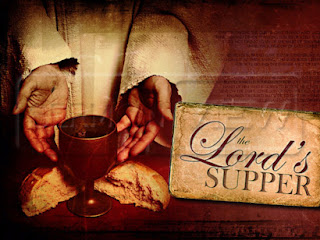What is the Sacrament of the Altar?
What is the Sacrament of the Altar? It is the true
body and blood of our Lord Jesus Christ under the bread and wine, instituted
by Christ Himself for us Christians to eat and to drink. (The Small
Catechism, The Sacrament of the Altar)
Do you jump out of bed on Sunday morning because
there's another chance to eat and drink the body and blood of Jesus? Or is the
Sacrament just one more thing to blow off when you've got other more important
things to do? The Small Catechism reminds us that the Sacrament of the Altar is
given to us Christians to eat and drink. That means that if we're Christians,
we'll eat and drink it.
To be a Christian is to hunger and thirst for that
very gift by which we have forgiveness of sins, new life and salvation. It is
called “a food of souls.” Luther also compares the Sacrament to an antidote for
the sin that ails you: “They should regard and use the Sacrament just like a
precious antidote against the poison that they have in them” (LC, 70).
Jesus died on the cross and rose again, taking away
our sins. That forgiveness is given to us in a special way in the Sacrament of
the Altar, because by His body and blood, Jesus lives in us and we live in Him.
That is Jesus’ body placed on your tongue and Jesus’ blood sipped by your lips!
Plus, He promised that to eat and drink His body and blood means He will raise
us up on the Last Day (John 6:54). Who wouldn't desire that?
The purpose of the Lord's Supper is to deliver
Christ's forgiveness. It's a gift—a saving and life-giving gift. The Lord’s
Supper is pure Gospel. On the one hand, we don't make laws and rules about it
and say how many times and how often you have to receive it. On the other hand,
since Jesus gave us this gift, we have to wonder when someone despises this
holy supper and doesn't ever come to receive it.
Luther had a great way of putting things clearly and
succinctly. For those who do not feel all that distressed about their sin and
do not experience hunger and thirst for the Sacrament, Luther writes, “For
those who are of such a mind that they do not realize their condition I know no
better counsel than that they put their hand into their shirt to check whether
they have flesh and blood. … In short, the less you feel your sins and
infirmities, the more reason you have to go to the Sacrament to seek help and a
remedy” (LC, paragraphs 75, 78).
Beware of thinking the Sacrament is just one more
religious thing you should do once in awhile! Rather, see it as the wonderful
gift that it is: forgiveness, new life and salvation. Christ has instituted
this meal of His body and blood for you, dear Christian. The One who hung upon
the cross now comes to you on the altar to feast upon His flesh and blood and
have eternal life. That's not a burden, but a joyous gift!
Lord Jesus Christ, You have prepared This feast for
our salvation; It is Your body and Your blood, And at Your invitation As weary
souls, with sin oppressed, We come to You for needed rest, For comfort, and for
pardon. (Lutheran Study Bible)

This was excellent. As someone who has recently come to a Lutheran understanding of the Sacraments (after many years as a Baptist, and of viewing them as symbols only), I just can't get over the beauty and richness of the Lord's Supper. Brings tears to my eyes every time I partake of it. Pure Gospel, indeed.
ReplyDelete